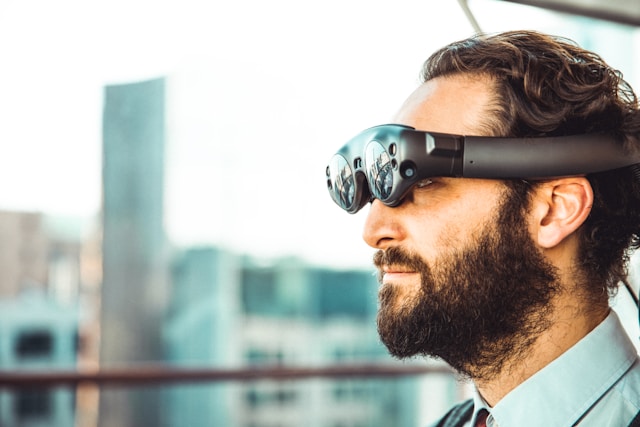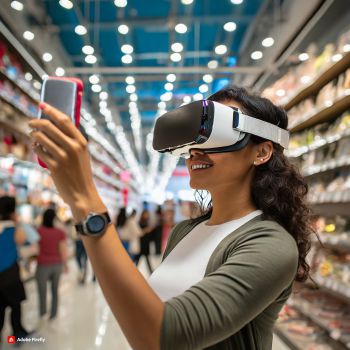Generation Z, born between 1997 and 2012, is a cohort that has grown up in a technology-driven world of the Internet and smartphones. Immersed in digital technology from a young age, it has profoundly influenced their behaviors, preferences, and shopping habits. And now, these worlds are merging into a unique but powerful 'phygital' experience that has the potential to completely redefine retail marketing as we know it.
What is Phygital Marketing?
Phygital refers to a shopping experience combining physical and digital elements to enhance customer interaction. This innovative approach creates a cohesive and engaging customer journey by integrating in-store experiences with online capabilities. According to a Salesforce study, 75% of Gen Z consumers expect a consistent brand experience across all channels.
For instance, customers might start shopping online by browsing products, reading reviews, and comparing prices. They can then visit a physical store to experience the products firsthand, interact with them, and receive personalized assistance from staff.
Moreover, phygital experiences often leverage augmented reality, mobile apps, and QR codes to bridge the gap between the digital and physical worlds. This blended experience empowers customers to access additional product information, promotions, or even virtual try-ons while they shop in-store. For example, Sephora has a Virtual Artist app allows customers to try different makeup looks using augmented reality (AR) before purchasing them in-store or online.
Ultimately, a phygital strategy aims to provide a more enriched and personalized shopping experience, making it more convenient and enjoyable for consumers while driving sales for retailers.
Why is Phygital Important to Gen Z?
Generation Z values convenience and instant gratification, often preferring platforms that offer quick access to information and streamlined shopping experiences. They are also heavily influenced by social media trends and peer reviews, which can significantly impact their brand preferences and loyalty. Generation Z is a significant economic driver, with approximately $360 billion in disposable income. Analysts predict their spending power to grow to a staggering $12 trillion by 2030, making them the wealthiest generation. Gen Z is the “most valuable generation for brands to attract,” said Jason Dorsey, president of the Center for Generational Kinetics.
Overall, their shopping habits reflect a desire for authenticity, personalization, and social responsibility, making them a distinctive force in the retail marketplace. To connect with this savvy audience, your brand needs to provide:
- Seamless Experiences: Gen Z values convenience and efficiency. Phygital experiences streamline the shopping process by offering flexibility and personalized options, meeting their needs effectively and enhancing their shopping experience.
- Interactive and Engaging Elements: This generation thrives on novelty and entertainment. Phygital elements like AR and interactive displays make shopping more fun and memorable, enhancing their overall shopping experience.
- Sharable Moments: Many phygital experiences are inherently shareable. With digital devices attached to the hip, Gen Z enjoys documenting and sharing their shopping journeys with their social networks. By providing shareable experiences, you are facilitating their social interactions and digital sharing.
Gen Z Appeal: Key Phygital Marketing Strategies
Phygital shopping appeals to Gen Z's desire for convenience, personalization, and social interaction. It allows them to seamlessly transition between online and offline experiences, tailoring their shopping journey to their unique preferences. Here are some key strategies to consider:
- Embrace Omnichannel Marketing: Ensure a consistent brand experience across all touchpoints (website, social media, physical stores, mobile apps).
- Leverage Emerging Technology: Integrate AR, virtual reality (VR), and artificial intelligence (AI) into the shopping experience.
- Personalize Content: Leverage customer data to deliver personalized recommendations and targeted promotions to drive engagement.
- Create Interactive Experiences: To engage Gen Z shoppers and host in-store events, live streams, and social media contests.
- Focus on Sustainability: Gen Z is increasingly conscious of environmental and social issues. Highlight sustainable practices and offer eco-friendly options.
The Bottom Line:
Phygital marketing is not just a fad; it's the future of retail. By embracing phygital marketing and catering to the unique needs and preferences of this audience of young adults, brands can build lasting relationships with this fast-growing, influential consumer segment.
Got An Idea? Lets Make It
Happen Today
Just Wanna Chat ? Just let Us Know When








